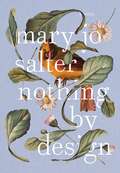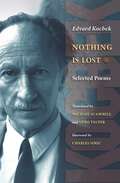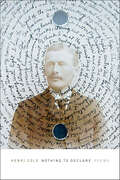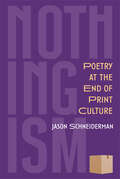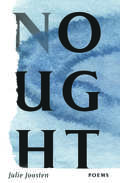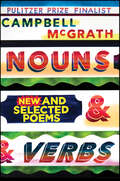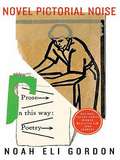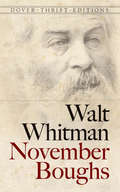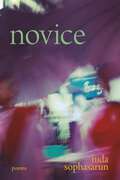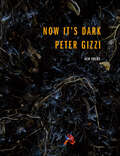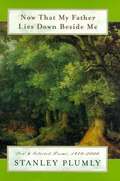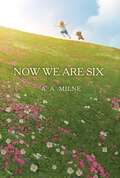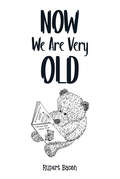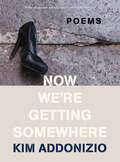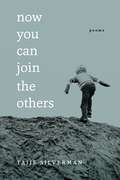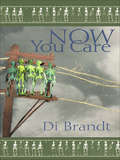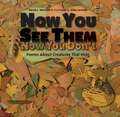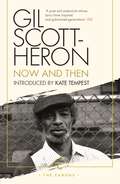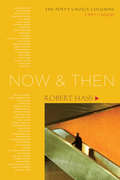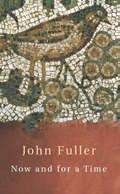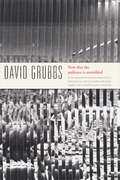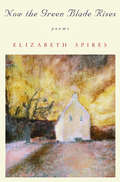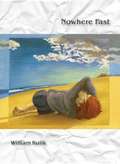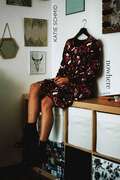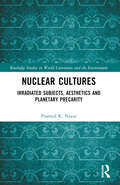- Table View
- List View
Nothing by Design
by Mary Jo SalterA beautiful collection of verse--both light and dark, elegiac and affirmative--from one of our most admired poets. The title Nothing by Design is taken from Salter's villanelle "Complaint for Absolute Divorce," in which we're asked to entertain the thought of a no-fault universe. The wary search for peace, personal and public, is a constant theme in poems as varied as "Our Friends the Enemy," about the Christmas football match between German and British soldiers in 1914; "The Afterlife," in which Egyptian tomb figurines labor to serve the dead; and "Voice of America," where Salter returns to the Saint Petersburg of her exiled friend, the late Joseph Brodsky. A section of charming light verse serves as counterpoint to another series entitled "Bed of Letters," in which Salter addresses the end of a long marriage. Artfully designed, with a highly intentional music, these poems movingly give form to the often unfathomable, yet very real, presence of nothingness and loss in our lives.
Nothing is Lost: Selected Poems (The Lockert Library of Poetry in Translation #52)
by Edvard KocbekThis is the first comprehensive English-language collection of verse by the most celebrated Slovenian poet of modern times and one of Europe's most notable postwar poets, Edvard Kocbek (1904-1981). The selections introduce the reader to the full spectrum of Kocbek's long and distinguished career, starting with the pantheist and expressionist nature poems of his early period and continuing through the politically engaged poetry written during and after World War II, to the philosophical and metaphysical meditations of his fecund late period. Readers will be struck by the originality and freshness of Kocbek's sinewy and intense vision, rendered into fluid and idiomatic English by two experienced translators. The Slovenian texts appear on the facing pages. The opening stanza of "Moon with a Halo" ? The man beside me was killed.He had a mother who bore himand a father who made him toys,he had a brother and a playful uncleand a little girl with blond braids,he had a wooden cart and a wooden horse,a trunkful of colored dreamsand a brook where he used to fish. ?
Nothing to Declare: Poems
by Henri ColeA bold new collection of poems of feral beauty and intense vulnerabilityThe poems in Henri Cole's ninth book, Nothing to Declare, explore life and need and delight. Each poem starts up from its own unique occasion and is then conducted through surprising (sometimes unnerving) and self-steadying domains. The result is a daring, delicate, unguarded, and tender collection. After his last three books—Touch, Blackbird and Wolf, and Middle Earth—in which the sonnet was a thrown shape and not merely a template, Cole's buoyant new poems seem trim and terse, with a first-place, last-ditch resonance. In their sorrowful richness, they combine a susceptibility to sensuousness and an awareness of desolation. With precise reliability of detail, a supple wealth of sound, and a speculative truthfulness, Cole transforms the pain of experience into the keen pleasure of expressive language. Nothing to Declare is a rare work, necessary and durable, light in touch but with just enough weight to mark the soul.
Nothingism: Poetry at the End of Print Culture (Poets On Poetry)
by Jason SchneidermanWhat is the internet doing to poetry? Good question! In Nothingism, Jason Schneiderman grapples with the way that digital culture has begun to reshape America’s poetry landscape, examining this profound shift in the way that poetry is written, read, and taught. He dives into the history of the poetic line and how previous media (oral, manuscript, print) have shaped our understanding of exactly what a poem is. In considering the transformations of poetry in the digital age, he finds that the transition from print to digital culture mirrors the earlier transition from manuscript to print culture. In this collection, the essays range from blistering manifesto to deep historical dives to gentle classroom guidance to considerations of the poems of James Merrill and Agha Shahid Ali, moving between the theoretical and the practical. Nothingism is both deeply personal and highly erudite, providing an engaging and scholarly account of reading, writing, and teaching poetry as our world continues its unsupervised lurch toward digital culture.
Nought
by Julie JoostenNought, the new poetry collection by Governor General's Literary Award finalist Julie Joosten, explores the intersections of body, identity, and love in poems that grapple with mysteries of neurology and metaphysics. Here the materiality of the body and experience have transformed into a language, a thought that resides in and between bodies. Throughout, Joosten masterfully engages with form and rhythm, crafting work that is intimage and perceptive, pulsing with life.
Nouns & Verbs: New and Selected Poems
by Campbell McGrathA major new collection from one of our best loved, most celebrated, and most original poetsDeeply personal but also expansive in its imaginative scope, Nouns & Verbs brings together thirty-five years of writing from Campbell McGrath, one of America’s most highly lauded poets. Offering a hint of where he’s headed while charting the territory already explored, McGrath gives us startlingly inventive new poems while surveying his previous work—lyric poems, prose poems, and a searing episodic personal epic, “An Odyssey of Appetite,” exploring America’s limitless material and spiritual hungers.Nothing is too large or small to remain untouched by McGrath’s voracious intellect and deep empathy—everything from Japanese eggplant to a can of Schaefer beer to the smokestacks of Chicago comes in for a close and perceptive look even as McGrath crosses borders and boundaries, investigating the enduring human experiences of love and loss. A book that stands on its own solid foundation, Nouns & Verbs captures the voice and vision of a truly singular poet.
Novel Pictorial Noise
by Noah Eli GordonAn exciting new collection of prose poetry from an emerging talent, Noah Eli Gordon's Novel Pictorial Noise was a winner of the 2006 National Poetry Series Open Competition, selected by esteemed poet John Ashbery. For over twenty years, the National Poetry Series has discovered many new and emerging voices and has been instrumental in launching the careers of poets and writers such as Billy Collins, Mark Doty, Denis Johnson, Cole Swensen, Thylias Moss, Mark Levine, and Dionisio Martinez.
November Boughs (Dover Thrift Editions)
by Walt Whitman"I loved this book. It's an inexpensive collection of Walt Whitman poems, letters, and essays that is well worth your time ... this book is worth purchasing and perusing due to its historical value of ruminations on American life." -- Old Musty BooksCompiled when the great poet was 70 years old, November Boughs offers verse and prose reminiscences of a singular American life. Walt Whitman's reflections begin with the essay "A Backward Glance O'er Travel'd Roads," in which he discusses the genesis of his most famous and controversial book, Leaves of Grass. A selection of poetry titled "Sands at Seventy" is followed by a series of essays and recollections that include "Slang in America," "What Lurks Behind Shakespeare's Historical Plays," "The Old Bowery," and notes on the life of the Quaker abolitionist Elias Hicks, whose body -- it was rumored -- he and a youthful group of friends once attempted to exhume.This affordable, high-quality edition of a rare book of poetry and prose provides a greater context for the interpretation of Whitman's other works. Essential reading for Whitman scholars, this volume is also of interest to historians of the Civil War, abolitionism, and nineteenth-century America.
Novice: Poems (Sewanee Poetry)
by Nida SophasarunHow close can a person come to home when their family has deserted it? Guided by this question, the poems in Nida Sophasarun’s Novice traverse natural, animal, and dream worlds, seeking intimacy in a snake coming in from the rain, a mother’s body imagined as a house, and the moon serving as both the missing piece and the linchpin in a night sky. Organized by tropical seasons and unfolding in Asia and the American South, Novice proposes that home is monumental and ruined, remembered and forgotten, local and diffuse, peopled and haunted.
Now It's Dark: New Poems (Wesleyan Poetry Series)
by Peter GizziThe poems in this brilliant follow-up to the National Book Award finalist Archeophonics, are concerned with grieving, with poetry and death, with beauty and sadness, with light. As Ben Lerner has written, "Gizzi's poetry is an example of how a poet's total tonal attention can disclose new orders of sensation and meaning. His beautiful lines are full of deft archival allusion." With litany, elegy, and prose, Gizzi continues his pursuit toward a lyric of reality. Saturated with luminous detail, these original poems possess, even in their sorrowing moments, a dizzying freedom.
Now That My Father Lies Down Beside Me: New & Selected Poems, 1970-2000
by Stanley PlumlyA selection from the career of one of the important poets of the last half of the 20th Century.
Now We Are Six (The Winnie-the-Pooh Collection)
by A. A. MilneWith a gorgeously redesigned cover and the original black and white interior illustrations by Ernest Shepard, this beautiful edition of the beloved classic poetry collection featuring Winnie-the-Pooh and Christopher Robin Now We Are Six by A. A. Milne is sure to delight new and old fans alike!Originally published after the novel Winnie-the-Pooh and the verse collection When We Were Very Young, A. A. Milne wrote this classic book of children&’s poems about and for his son Christopher Robin when he turned six. With appearances from the beloved Winnie-the-Pooh throughout, these sweet and funny poems tell of playful adventures, the joys and pains of growing up, memorable animal friends, and more.
Now We Are Very Old
by Rupert BaconIf poetry be the food of love, read on’ as some particularly famous playwright bloke once said or maybe he didn’t. It might have been that he said, ‘if music be the food of love, play on’. Frankly, be that as it may, this composer of little rhyming ditties thinks poems are rather fun and many of them are, in any case, about things he loves. Thus, it works either way. This little volume of twenty-four poetic offerings on various themes (plus one totally free extra ditty in the introduction, please note) rather proves the point even if the author most un-humbly does say it himself. Read out loud with rhythm in your voice. Set them to music of your own choosing and sing them if you like. However you prefer to take your poems, please enjoy them for what they are: a bit of simple fun.
Now We're Getting Somewhere: Poems
by Kim AddonizioA dark, no-holds-barred, and often hilarious collection from a prize-winning poet, veering between the poles of self and world. Kim Addonizio’s sharp and irreverent eighth volume, Now We’re Getting Somewhere, is an essential companion to your practice of the Finnish art of kalsarikännit—drinking at home, alone in your underwear, with no intention of going out. Imbued with the poet’s characteristic precision and passion, the collection charts a hazardous course through heartache, climate change, dental work, Outlander, semiotics, and more. Combatting existential gloom with a wicked, seductive energy, Addonizio investigates desire, loss, and the madness of contemporary life. She calls out to Walt Whitman and John Keats, echoes Dorothy Parker, and finds sisterhood with Virginia Woolf. Sometimes confessional, sometimes philosophical, these poems weave from desolation to drollery and clamor with raucous imagery: an insect in high heels, a wolf at an uncomfortable party, a glowing and self-serious guitar. A poet whose “voice lifts from the page, alive and biting” (Sky Sanchez, San Francisco Book Review), Addonizio reminds her reader, "if you think nothing & / no one can / listen I love you joy is coming."
Now You Can Join the Others: Poems
by Taije SilvermanNow You Can Join the Others, the second collection of poetry by Taije Silverman, traces the absurdities of desire, the shifting nature of grief, and the concentric circles of history and myth that ripple around motherhood and marriage. Set in cities around the world and on real and metaphorical islands, narratives slip between centuries and spaces: a Philadelphia bedroom and Berlin’s Jewish Museum, a castle in Naples and a Chuck E. Cheese. Scenes of sexual and racial violence force an interrogation of words through a multiplicity of voices, and the othering of self becomes a shared, even reassuring alienation. From a sixteenth-century philosopher to a lecherous innkeeper in Modena, from the founding of Athens to the hatching of cicadas, this book investigates human, geological, and cyclical forms of time, suggesting that they are as material and evasive as language. Intricate, unexpected, and probing, Now You Can Join the Others is a radically candid, revelatory collection.
Now You Care
by Di BrandtNominated for a Griffin Poetry PrizeIn Now You Care, her fifth collection of poetry, Di Brandt voices a passionate argument against environmental degradation and a plea for psychic transformation in our violent times. Tuned in to the toxic fallout of over-industrialization and war, these poems face the dark side of our postmodern climate with a language that doesn't give in. They tremble and shake, they rage against despair, they speak against death and wrestle with the fateful spirits of Armageddon to loosen their choke-hold on humanity. Perhaps we won't figure it out and the horizon is already on fire, and our best love will never be more than an approximation of regret, but grass still grows between the cement blocks of the sidewalk to 'grin of the wild.'
Now You See Them, Now You Don't: Poems About Creatures that Hide
by David L. HarrisonFind me if you can. . . for if you don&’t, I&’ll be here tomorrow . . . you won&’t. Animals and insects use camouflage to hide from hunters or to ambush prey. Stealth is a very useful technique when it comes to survival. In this fun and informative collection of poems, we meet animals such as the polar bear and the octopus; the ghost crab and the copperhead snake; and many more that use camouflage to hunt or to hide. Giles Laroche&’s intricate cut-paper illustrations are beautiful and life-like. Readers will have to look carefully or run the risk of a hunter sneaking up on them. Back matter offers additional information about each of the nineteen animals.
Now and Then: The Poems Of Gil Scott-heron (Canons #101)
by Gil Scott-HeronA wide-ranging collection of poetry by the iconic &“poet and polemicist whose lyrics have inspired and galvanized generations&” (GQ). Musician, poet, and spoken-word artist Gil Scott-Heron influenced generations of artists with his highly original, disarmingly witty, politically provocative song-poems. Coming into prominence in the early 1970s, the self-proclaimed &“bluesologist&” has earned, among many other accolades, the title of Godfather of Rap. Now and Then presents a collection of poems from across Scott-Heron long career—including some of his most iconic recorded pieces, as well as lesser-known works that have never been recorded. With an introduction by Kate Tempest, this collection carries the reader from the global topics of political hypocrisy and the dangers posed by capitalist culture to painfully personal themes and the realities of everyday life. Through it all, Scott-Heron&’s message is both steeped in history and as urgent as ever.&“Scott-Heron is such a fine writer…the least likely pop star ever, one with a truly brilliant mind&”—Sunday Times, UK &“Some of the funniest and most literate lyrics in all music . . . From deadpan attacks on racism to withering sarcasm about the Great Society; from Chomskian rants to parodies of media shallowness—every line comes coated in a sardonically witty turn of phrase.&”—Time Out
Now and Then: The Poet's Choice Columns, 1997-2000 (Poetry Ser.)
by Robert HassDuring his years as Poet Laureate, Robert Hass revived a popular 19th–century tradition: including poetry in our daily newspapers. "Poet's Choice" went on to appear as a nationally syndicated column across the country from 1997 to 2000. The column, which featured poems relevant to current headlines, serves as a symbol of the continuing importance of poetry in our daily lives. This collection contains well–known poets such as Wallace Stevens, Rita Dove, John Ashbery, and Robert Frost, as well as emerging and translated poets such as Jaime Sabines and Czeslaw Milosz. Also included are Hass's essays that accompanied the poems. Encapsulating a world before 9/11, this collection serves as both remembrance and reminder of a period in our history, and as a celebration of the poets whose works transcend time.
Now and for a Time
by John FullerThroughout his long and prolific career, John Fuller has been admired for the way in which he melds levity with serious reflection. In this beautiful new collection of twenty-one poems he proves himself, once again, a true master of this art. They take us from birth to death: from a baby's first delightful babblings, to the dignified, measured words of a man surveying his life and marriage, and looking forward into the unknown. There are moments of great joie de vivre, of pleasure in the earthy things of life; and yet, beyond, there is always a sense of a vaster, more elusive universe. The snorting of the horses in a field in 'Dreams', the egret on the rock in 'Sentinel': these are nature's mysteries. To make sense of these, we have language and music. Celebratory, playful, reconciled to the questions that will not be answered, these poems exude a miraculous kind of peace and understanding: 'A point of closure that allows the next/Inevitable sentence to begin'.
Now that the audience is assembled
by David GrubbsFollowing his investigation into experimental music and sound recording in Records Ruin the Landscape, David Grubbs turns his attention to the live performance of improvised music with an altogether different form of writing. Now that the audience is assembled is a book-length prose poem that describes a fictional musical performance during which an unnamed musician improvises the construction of a series of invented instruments before an audience that is alternately contemplative, participatory, disputatious, and asleep. Over the course of this phantasmagorical all-night concert, repeated interruptions take the form of in-depth discussions and musical demonstrations. Both a work of literature and a study of music, Now that the audience is assembled explores the categories of improvised music, solo performance, text scores, instrument building, aesthetic deskilling and reskilling, and the odd fate of the composer in experimental music.
Now the Green Blade Rises: Poems
by Elizabeth Spires"Spires is a jewel of a poet, never self-conscious or self-indulgent."--Los Angeles Times Opening with a powerful sequence of poems about her mother's death, Elizabeth Spires writes about the life-and-death matters of midlife: the separation of parent from child, the loss of family and friends, the evolving nature of our closest friendships. These poems find hope in the seasonal and spiritual moment when "the green blade rises."
Nowhere Fast
by William KulikNowhere Fast offers a view of a world where fools rush in only to be baffled by ordinary dramas--of sexuality and gender, of family, of death and dying. By turns rueful, sardonic and tender, these narratives are overseen by a joyous mockery which reveals to us what Allen Ginsberg once called our quintessential "jerkhood"--to be living in a realm where satisfaction is denied and expectations are frustrated--the heart and soul of the absurd. In sixty exquisite prose poems, memory, dream and fantasy take turns animating the many identities of the "I" in a dark comedy of manners where the surreal underscores our eternal condition. In turns jocular and menacing, masculine and vulnerable, bawdy and rueful, Nowhere Fast marks the debut collection of a poet it seems we've always been waiting for.
Nowhere: Poems (Mary Burritt Christiansen Poetry Series)
by Katie SchmidA book of wild imagination and linguistic play, Nowhere begins by chronicling the pain that the speaker and her absent father endure during the years they are separated while he is in prison. The alternative universe the speaker builds in order to survive this complex loss and its aftermath sees her experimenting with her body to try to build connection, giving it away to careless and indifferent lovers as she dreams of consuming them in the search for a coherent self. But can the speaker voice her trauma and disjunction? Can anyone, or is suffering something that cannot be said, but only hinted at? Ultimately the book argues that the barest hour of suffering can be the source of immense creative power and energy, which is the speaker&’s highest form of consolation.This brilliant debut collection offers cohesive trauma narratives and essential counter-narratives to addiction stories, and it consistently complicates the stories told by the world about so-called fatherless girls and the bodies of women.
Nuclear Cultures: Irradiated Subjects, Aesthetics and Planetary Precarity (Routledge Studies in World Literatures and the Environment)
by Pramod K. NayarNuclear Cultures: Irradiated Subjects, Aesthetics and Planetary Precarity aims to develop the field of nuclear humanities and the powerful ability of literary and cultural representations of science and catastrophe to shape the meaning of historic events. Examining multiple discourses and textual materials, including fiction, poetry, biographies, comics, paintings, documentary and photography, this volume will illuminate the cultural, ecological and social impact of nuclearization narratives. Furthermore, this text explores themes such as the cultures of atomic scientists, the making of the bomb, nuclear bombings and disasters, nuclear aesthetics and art, and the global mobilization against nuclearization. Nuclear Cultures breaks new ground in the debates on "the nuclear" to foster the development of nuclear humanities, its vocabulary and methodology.
